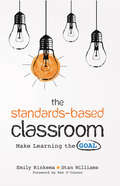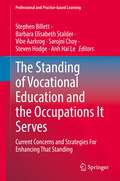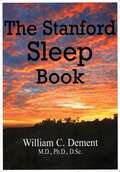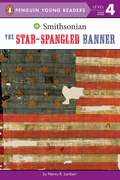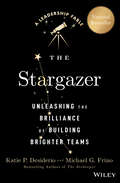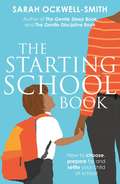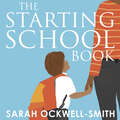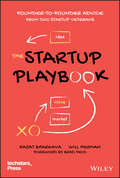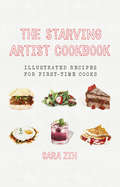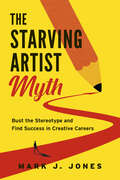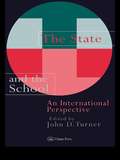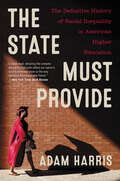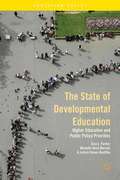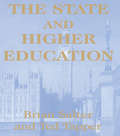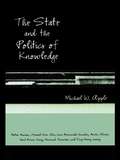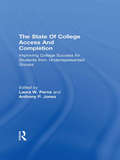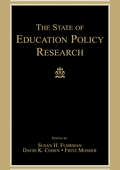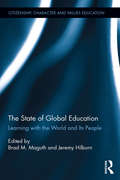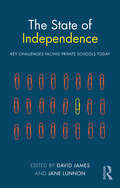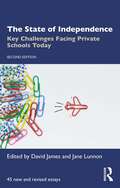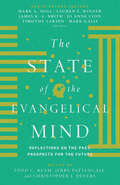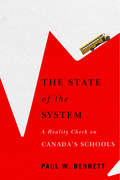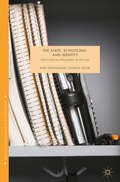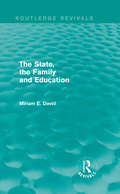- Table View
- List View
The Standards-Based Classroom: Make Learning the Goal
by Emily A. Rinkema Stan WilliamsGet to know which practices related to curriculum, instruction, and assessment are essential to make learning the goal for every student! You’ll learn how to Create learning targets that are scalable and transferable within and across units Develop instructional scales for each learning target Design non-scored practice activities and assessments Introduce and model skills that will be assessed and design tasks that allow students to use these skills Differentiate instruction and activities based on data from various types of assessments Maintain a gradebook that tracks summative achievement of learning targets, and score assessments accordingly Communicate progress clearly and efficiently with students and families
The Standing of Vocational Education and the Occupations It Serves: Current Concerns and Strategies For Enhancing That Standing (Professional and Practice-based Learning #32)
by Stephen Billett Steven Hodge Sarojni Choy Barbara Elisabeth Stalder Vibe Aarkrog Anh Hai LeThis book addresses what is, perhaps, the single most important issue for vocational education; its relatively low standing in an era of high aspiration. The work explores the nature, extent and consequences for an educational sector that whilst having an increasingly important role in contemporary societies is seen to be of low standing across both countries with developed and developing economies. Some of the standing is associated with the occupation it serves and this is highlighted in an era of high aspiration by young people and their parents. The consequences are far-reaching. This includes how governments and community view and support vocational education, parents and familiars advise about participation in it and young people’s decision-making associated with their post-school pathways. More than describing this problem, the focus of this collection is how this issue can be redressed through the actions of supra-government agencies, governments, schools in tertiary education institutions, industry and professional bodies and employers. It sets out the quality and extent of societal sentiments in shaping how vocational education and the occupation it serves are projected, across countries, continents and cultures, and offers a range of perspectives and contributions from scholars on how this issue might be redressed. These contributions are drawn together and synthesised into sets of propositions, practices and approaches directed towards governments, schooling and tertiary education institutions, educators, researchers, industry and professional bodies and employers. In this way, the book seeks to provide an authoritative, seminal, comprehensive and central text to understand and respond to this central issue for vocational education.
The Stanford Sleep Book
by William C. Dement"This book had its genesis in the need created by my involvement with undergraduate teaching starting in the Fall of 1970 when I was a resident fellow and taught a course on sleep for the students in my dormitory. The course began to attract other students and because of this I decided to offer a formal presentation in Winter Quarter 1971 and I have offered a course on sleep annually up until Winter Quarter 2003. Sleep and Dreams was not offered in 2004 or 2005 but due to high student demand, we resurrected the course for the Winter Quarter 2006. Around 1980, the various handouts developed into a quasi-textbook and by the middle of the 90s, the first Stanford Sleep Book was born. The current volume is the 5th edition"--Acknowledgements.
The Star-Spangled Banner (Smithsonian)
by Nancy R. LambertThree cheers for the red-white-and-blue in this Smithsonian nonfiction reader!The original Star-Spangled Banner that flew over Fort McHenry, Baltimore, in 1814 and inspired Francis Scott Key to write the words that would become the national anthem of the United States is the showpiece of the Smithsonian! In this lively nonfiction book, young readers will read about the story behind the flag, the song, and how the Smithsonian cares for this most precious national treasure.
The Stargazer: Unleashing the Brilliance of Building Brighter Teams
by Michael G. Frino Katie P. DesiderioWall Street Journal bestselling authors deliver a powerful and actionable story to build high-performing teams with concepts rooted in nature. In The Stargazer: Unleashing the Brilliance of Building Brighter Teams, human capital experts and Wall Street Journal bestselling authors Drs. Katie P. Desiderio and Michael G. Frino deliver a thought-provoking leadership fable. The story explores the importance of growth partnership as a catalyst for building high-performing teams. Readers will discover the inspiring journey of Jack, a retired teacher and current vintner from Yountville, California, as he transforms his struggling vineyard and his own life through a series of profound experiences deeply rooted in the natural world. Throughout the book, readers are invited to reflect on their leadership styles and team dynamics, with practical exercises and symbolic activities that inspire growth and brilliance. Guided by the lessons from the stars and stones, Jack returns to his vineyard with a renewed vision. Join Jack on this unexpected journey illuminating the path to building brighter, more cohesive teams. You'll learn about: The key features of the retreat including, Choose Your Be Mindsets, Open Eyes, Mind, Ears, and Heart, and Meaningful Work, each illustrated through metaphors from Jack's experiences. How to create your personal star system—a supportive network of individuals who help each other grow and shine brighter together. How to use the COMPASS framework to encourage team brilliance through principles of trust, growth, and interconnectedness. Jack's journey from lone wolf to collaborative leader in The Stargazer: Unleashing the Brilliance of Building Brighter Teams serves as a powerful inspiration for managers and business leaders seeking to build strong, interconnected teams.
The Starting School Book: How to choose, prepare for and settle your child at school
by Sarah Ockwell-SmithAn indispensable guide for parents whose children are about to start, or have recently started school.Starting school is a huge important milestone for children and their parents. The best school years happen when everyone involved feels happy and engaged with the whole experience, and yet, with so much information to digest and so little guidance available, the process can be incredibly confusing. The Starting School Book is a reassuring and practical guide for parents of school-age children. Sarah Ockwell-Smith provides clear and helpful advice for each stage of the process, whether your are just beginning to think about your child's education, applying for a school place, preparing your child for starting at the school you have chosen, or your child has already started school and you would like to help smooth the transition.Specific guidance includes:* Starting school ages, policies and procedures* How to decide the best starting age for a summer-born child* What to look for when choosing a school and what questions to ask when you visit* How to prepare your child emotionally and practically for starting school* Common concerns including settling in, separation anxiety, friendship issues, school refusal and reconnecting with your child at the end of the day* Understanding your own feelings about the transition and your role in the wider school communityWith case studies and advice from parents who have been through it, and enlightening tips from teachers, The Starting School Book provides all the information you need to help your child have a positive, calm and happy school experience.
The Starting School Book: How to choose, prepare for and settle your child at school
by Sarah Ockwell-SmithAn indispensable guide for parents whose children are about to start, or have recently started school.Starting school is a huge important milestone for children and their parents. The best school years happen when everyone involved feels happy and engaged with the whole experience, and yet, with so much information to digest and so little guidance available, the process can be incredibly confusing. The Starting School Book is a reassuring and practical guide for parents of school-age children. Sarah Ockwell-Smith provides clear and helpful advice for each stage of the process, whether your are just beginning to think about your child's education, applying for a school place, preparing your child for starting at the school you have chosen, or your child has already started school and you would like to help smooth the transition.Specific guidance includes:* Starting school ages, policies and procedures* How to decide the best starting age for a summer-born child* What to look for when choosing a school and what questions to ask when you visit* How to prepare your child emotionally and practically for starting school* Common concerns including settling in, separation anxiety, friendship issues, school refusal and reconnecting with your child at the end of the day* Understanding your own feelings about the transition and your role in the wider school communityWith case studies and advice from parents who have been through it, and enlightening tips from teachers, The Starting School Book provides all the information you need to help your child have a positive, calm and happy school experience.
The Starting School Book: How to choose, prepare for and settle your child at school
by Sarah Ockwell-SmithAn indispensable guide for parents whose children are about to start, or have recently started school.Starting school is a huge important milestone for children and their parents. The best school years happen when everyone involved feels happy and engaged with the whole experience, and yet, with so much information to digest and so little guidance available, the process can be incredibly confusing. The Starting School Book is a reassuring and practical guide for parents of school-age children. Sarah Ockwell-Smith provides clear and helpful advice for each stage of the process, whether your are just beginning to think about your child's education, applying for a school place, preparing your child for starting at the school you have chosen, or your child has already started school and you would like to help smooth the transition.Specific guidance includes:* Starting school ages, policies and procedures* How to decide the best starting age for a summer-born child* What to look for when choosing a school and what questions to ask when you visit* How to prepare your child emotionally and practically for starting school* Common concerns including settling in, separation anxiety, friendship issues, school refusal and reconnecting with your child at the end of the day* Understanding your own feelings about the transition and your role in the wider school communityWith case studies and advice from parents who have been through it, and enlightening tips from teachers, The Starting School Book provides all the information you need to help your child have a positive, calm and happy school experience.
The Startup Playbook: Founder-to-Founder Advice from Two Startup Veterans (Techstars)
by Rajat Bhargava Will HermanGet the real guidance you need to create and build your first startup company from founders who have been there many times before. The first run printing of The Startup Playbook SOLD OUT! So, we revised, expanded, and improved this second edition, including a new foreword by Brad Feld, author of Venture Deals. We still give our personal, how-to guide for building your startup from the ground up. You'll find a collection of the major lessons and shortcuts we've learned that will shift the odds in your favor. We're sharing our tips, secrets, and advice in a frank, founder-to-founder discussion with you. We make no bones about our bias. We're on your side, the founder's side. While venture capitalists, investors, and accelerators/incubators can add great value in the startup ecosystem, this book isn't about their points of view. We'll tell you where our interests as founders diverge from those on the other side of the table—investors, bankers, advisors, board members, and others—and what to do when that happens. The Startup Playbook is not a recipe, it's not a template, it's not a list of tasks to do. It's our insider's guide to starting a company and running it successfully in those critical early months. Between us, we've started over a dozen high-tech software companies and raised over $500 million in investment capital. We've acquired over thirty-five companies, had three of our startups go public, sold six of them, and we made billions of dollars for shareholders. We've also invested in over eighty startups, advised and mentored over two hundred companies and actively worked with venture capitalists (VCs), incubators, and accelerators to help launch many other new startups. We've had plenty of failures, too. And we've probably learned more from those than from the successes. We share those lessons as well. The Startup Playbook is full of our advice, guidance, do's, and don'ts from our years of experience as founders many times. We want to share our hard-earned knowledge with you to make success easier for you to achieve. "This book is extraordinarily fresh and exciting. In an accessible, straight talk fashion, this book is a manual, and an inspiration. The Startup Playbook is smart and avoids the 'I am so smart' over-writing endemic to the genre. Read this as it is presented. You'll be doing yourself a tremendous favor."—Amazon Reviewer
The Starving Artist Cookbook: Illustrated Recipes for First-Time Cooks
by Sara ZinWhen life hands you lemons... paint them and then write down the recipes. Aspiring artist Sara Zin turned 30 and hit a wall. She was hungry--starving--to find meaning in her art. Plus, she really wanted a home-cooked meals. Zin didn't know how to make them; she never learned how to cook. She decided it was time. And, as a painter, it was only logical that she paint every dish once it was prepared. This cookbook is the result of that year's journey, with basic recipes for: French Toast and Crispy Bacon The Manly Burger Tomato Soup Simple Carbonara Oatmeal Cookies This book will appeal to anyone who likes to eat--starving or not.
The Starving Artist Myth: Bust the Stereotype and Find Success in Creative Careers
by Mark J. JonesCreative sector jobs are driving our economy and offer a viable career path for today's youth.Careers in the creative sector offer flexibility and security. Why then are more young people not seeking them out? Because they believe the myth of the starving artist, which conjures up images of penniless writers and artistic bohemians. The myth leads families and some educators to discourage young people from choosing a path they would love in favour of more secure fields. Years later, they could come to regret that choice.Mark J. Jones, Dean of the Faculty of Animation, Art and Design at Sheridan College, one of the top post-secondary schools for creative arts and animation in Canada, shows that the persistent belief in the starving artist myth is not just costing young people the opportunity to explore satisfying careers, it is also costing our economy in terms of lost opportunity. Through their education, artists, musicians, writers, media makers, designers, actors, and others have come to understand how to reach their audiences and customers, and are perfectly poised to contribute to the global creative market.In The Starving Artist Myth, Jones erases any remaining doubt of the opportunities in the creative economy by getting at the underbelly of the stereotype and answering the what, the why, and the how of achieving career goals.
The State And The School: An International Perspective
by John D. TurnerThere was once agreement that education was too important to be left to politicians; now the view is that education is too important to be left to teachers. Whereas the curriculum and syllabus were previously the concern of the professionals, the government now distrusts these professionals. This has resulted in the Secretary for State assuming massive powers in a series of Education Acts, and there is now a national curriculum which intrudes into the fine details of the syllabus. Equally, the twin concepts of accountability and cost effectiveness are now as common in discussions about education as they are in discussions on industry and commerce.; These trends, however, are not restricted to any level of education or to any one country. They are as widespread in the great universities as they are in primary schools, and they are on the agenda not only in Britain and Europe, but in Australia, the US and virtually every country in the developed and developing world. With this in mind, this book examines the role of the state in education in many different countries and cultures.
The State Must Provide: Why America's Colleges Have Always Been Unequal and How to Set Them Right
by Adam HarrisAmerica’s colleges and universities have a shameful secret: they have never given Black people a fair chance to succeed. From its inception, our higher education system was not built on equality or accessibility, but on educating—and prioritizing—white students. Black students have always been an afterthought. While governments and private donors funnel money into majority white schools, historically Black colleges and universities (HBCUs), and other institutions that have high enrollments of Black students, are struggling to survive, with state legislatures siphoning away federal funds that are legally owed to these schools. In The State Must Provide, Adam Harris reckons with the history of a higher education system that has systematically excluded Black people from its benefits. <p><p> Harris weaves through the legal, social, and political obstacles erected to block equitable education in the United States, studying the Black Americans who fought their way to an education, pivotal Supreme Court cases like Plessy v. Ferguson and Brown v. Board of Education, and the government’s role in creating and upholding a segregated education system. He explores the role that Civil War–era legislation intended to bring agricultural education to the masses had in creating the HBCUs that have played such a major part in educating Black students when other state and private institutions refused to accept them. <p><p> The State Must Provide is the definitive chronicle of higher education’s failed attempts at equality and the long road still in front of us to remedy centuries of racial discrimination—and poses a daring solution to help solve the underfunding of HBCUs. Told through a vivid cast of characters, The State Must Provide examines what happened before and after schools were supposedly integrated in the twentieth century, and why higher education remains broken to this day.
The State Of Developmental Education
by Tara L. Parker Michelle Sterk Barrett Leticia Tomas BustillosThe State of Developmental Education is the first book to provide a thorough, comparative picture of how developmental education is carried out at higher education institutions and investigate how different state-level policies and priorities change the availability, types, and quality of developmental education available.
The State and Higher Education: State & Higher Educ. (Woburn Education Ser.)
by Brian Salter Ted Tapper Dr Brian SalterFirst Published in 1994. Routledge is an imprint of Taylor & Francis, an informa company.
The State and the Politics of Knowledge
by Michael W. AppleThe State and the Politics of Knowledge extends the insightful arguments Michael Apple provided in Educating the "Right" Way in new and truly international directions. Arguing that schooling is, by definition, political, Apple and his co-authors move beyond a critical analysis to describe numerous ways of interrupting dominance and creating truly democratic and realistic alternatives to the ways markets, standards, testing, and a limited vision of religion are now being pressed into schools.
The State of College Access and Completion: Improving College Success for Students from Underrepresented Groups
by Laura W. Perna Anthony P. JonesDespite decades of substantial investments by the federal government, state governments, colleges and universities, and private foundations, students from low-income families as well as racial and ethnic minority groups continue to have substantially lower levels of postsecondary educational attainment than individuals from other groups. The State of College Access and Completion draws together leading researchers nationwide to summarize the state of college access and success and to provide recommendations for how institutional leaders and policymakers can effectively improve the entire spectrum of college access and completion. Springboarding from a seminar series organized by the Advisory Committee on Student Financial Assistance, chapter authors explore what is known and not known from existing research about how to improve student success. This much-needed book calls explicit attention to the state of college access and success not only for traditional college-age students, but also for the substantial and growing number of "nontraditional" students. Describing trends in various outcomes along the pathway from college access to completion, this volume documents persisting gaps in outcomes based on students’ demographic characteristics and offers recommendations for strategies to raise student attainment. Graduate students, scholars, and researchers in higher education will find The State of College Access and Completion to be an important and timely resource.
The State of Education Policy Research
by David K. Cohen; Susan H. Fuhrman; Fritz MosherThe State of Education Policy Research is a comprehensive, insightful evaluation of the strengths and weaknesses of education policy research in the U.S. today. Editors Susan Fuhrman, David Cohen, and Fritz Mosher examine key issues facing policymakers and researchers including race, education equity, teacher quality, early education, privatization, and the politics of education policy. Collectively, the chapters present a complex mosaic of education policy research that integrates the views of policy experts from education, economics, and related disciplines. Important topics discussed in this influential new text include: Politics of education—Covers research on key political groups including teachers’ unions, business roundtables, parent and/or religious advocates, as well as state and federal lawmakers. Race—Discusses race as an issue as well as a non-issue and includes a discussion of the testing gap. State policies— Provides an overview of state policies directed at improving teacher quality and discusses the reality of a teacher shortage. National Trends—Analyzes current trends toward centralization and standardization and the growing influence of federal and state mandates. This book is appropriate for advanced courses in education administration, politics, and policy. It will also appeal to policy researchers in education, economics, and political science, to policy makers at the federal, state, and local levels and to the academic libraries serving them.
The State of Global Education: Learning with the World and its People (Citizenship, Character and Values Education)
by Jeremy Hilburn Brad MaguthA battle is being waged in classrooms and capitals around the world over the goals and objectives of the future of global education. While there is growing research in the area of global education, much remains to be uncovered, challenged, and learned through sound empirical research and conceptual explorations. What type of global citizens will schools promote? What types of policies, programs and instructional practices best promote effective global citizenship? Will global education curricula advance an unwavering loyalty to neoliberal ideologies and interests over the strengthening of human rights and the environmental health of our planet? This volume presents a series of research studies and innovative instructional practices centered on advancing global learning opportunities and literacies. The authors in this volume initiate a much needed conversation on ways students in multiple contexts can and should learn with the world and its people. Part I addresses global education in theory, with a particular focus on development, intercultural competence, and global citizenship. Part II addresses educational programs and practices that foster global learning and action to help build a better future for all citizens of our planet – including experiential education, university initiatives, and conceptual approaches to teaching and learning. This scholarship spans four continents in a multitude of educational contexts – primary, secondary, and tertiary - each with a focus on a different dimension of the possibilities and pitfalls in teaching about and with the world and its people.
The State of Independence: Key Challenges Facing Private Schools Today
by David James Jane LunnonExploring the most significant challenges facing independent schools today, this book asks leading figures from education, economics, politics, philosophy and the arts to give their views on how independent schools can adapt to rapidly changing markets which see them scrutinised as never before. Acknowledging the independent sector as a vital and growing part of the global education system, this book explores how schools are to respond to financial, moral, pastoral and academic challenges, and so ensure their own survival, and the futures of the children they educate. Breaking a complex and varied field down into ten clear areas of analysis, essays written by leading education experts tackle the key challenges faced by independent schools around the world. Commentators consider the issues created by the upward trend of educating international students, question the extent to which independent schools have echoed societal movements towards greater access, diversity and gender fluidity, and provide first-hand insight into the experiences of staff, pupils and parents involved in the everyday functioning and longer-term development of the independent sector. A health check on this most controversial of sectors, this book will enlighten and inform not only those working in independent schools today, but anyone interested in education, and will make an important contribution to a bigger debate about the place of independent schools at a time of political, economic and societal uncertainty.
The State of Independence: Key Challenges Facing Private Schools Today
by David James Jane LunnonExploring the most significant challenges facing independent schools today, this book asks leading figures from education, economics, politics, philosophy and the arts to give their views on how independent schools can adapt to rapidly changing markets which see them scrutinised as never before. A best-seller in its first edition, this fully revised second edition includes many new and updated essays, as well as featuring 26 brand new contributions from leading figures from education. How the sector has responded to the Covid-19 pandemic dominates some of the new contributions, but leading thinkers on areas as complex as gender identity and race write about how independent schools will have to change if they are to survive and flourish in the 21st century. This is a book that, more than ever before, anyone interested in education must read.
The State of the Evangelical Mind: Reflections on the Past, Prospects for the Future
by Mark A. Noll Timothy Larsen Lauren F. Winner Mark Galli Richard J. Mouw James K. Smith David C. Mahan Jo Anne Lyon C. Donald SmedleyScandal of the Evangelical MindRichard J. MouwMark A. NollJo Anne LyonDavid C. Mahan and C. Donald SmedleyTimothy LarsenLauren WinnerJames K. A. SmithMark GalliThe State of the Evangelical Mind
The State of the System: A Reality Check on Canada's Schools
by Paul W. BennettOver the last fifty years, Canada's public schools have been absorbed into a modern education system that functions much like Max Weber's infamous iron cage. Crying out for democratic school-level reform, the system is now a centralized, bureaucratic fortress that, every year, becomes softer on standards for students, less accessible to parents, further out of touch with communities, and surprisingly unresponsive to classroom teachers. Exploring the nature of the Canadian education order in all its dimensions, The State of the System explains how public schools came to be so bureaucratic, confronts the critical issues facing kindergarten to grade 12 public schools in all ten provinces, and addresses the need for systemic reform. Going beyond a diagnosis of the stresses, strains, and ills present in the system, Paul Bennett proposes a bold plan to re-engineer schools on a more human scale as the first step in truly reforming public education. In place of school consolidation and managerialism, one-size-fits-all uniformity, limited school choice, and the "success-for-all" curriculum, Bennett advocates for a new set of priorities: decentralize school governance, deprogram education ministries and school districts, listen to parents and teachers, and revitalize local education democracy. Tackling the thorny issues besetting contemporary school systems in Canada, The State of the System issues a clarion call for more responsive, engaged, and accountable public schools.
The State, Schooling and Identity
by Kari Kantasalmi Gunilla HolmThis book offers insights into the relationship between nation-state and education by problematizing and analyzing the assumed straightforwardness of the role of education and schooling. Placing the issue in very contemporary contested nation-state structures like Scotland, Catalonia, Ukraine and Belgium. These conflict situations and contested power relations are in a way some of Europe's internal North-South struggles. In addition, the particular Nordic North-South example of the Saami with their status as indigenous people recognized in international law is viewed in terms of their educational struggle for better consideration of their cultural features in Saami land crossing the Nordic states. The book focuses on the Nordic countries, often viewed as globally exemplary in their educational arrangements, but casts deeper insight into Nordic education and points to problematic schooling issues in Northern Europe. This volume presents somewhat unexpected views on European educational arrangements with regard to the European growing diversity.
The State, the Family and Education (Routledge Revivals)
by Miriam DavidIn The State, The Family and Education, first published in 1980, Miriam David provides an entirely new analysis of the relationship of the State to the family and education. David shows how the State, through its educational policies, regulates family relationships with, and within, schools. This book provides a welcome analysis of educational policy from a socialist-feminist perspective, re-examining the ways in which women as parents, teachers and pupils are involved in the education system. This book will be of interests to students of education.
